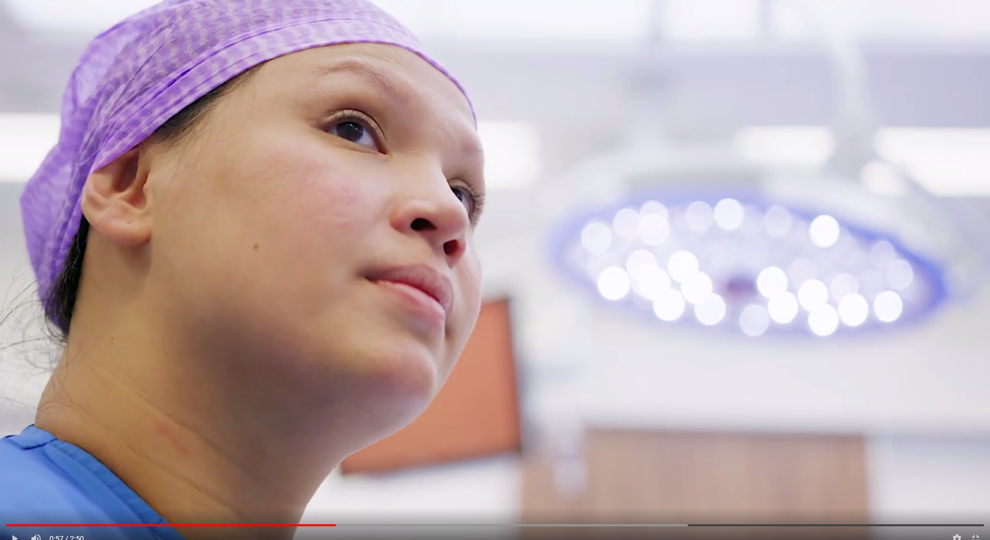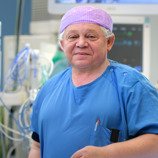Anesthesiology
Anesthesiologists handle the sedation during your surgery or procedure, so you can safely endure it. We will discuss the procedure and the sedation that best fits you before your treatment. We will keep a close eye on you during and after your surgery. We have pain treatment available for you to help you feel more comfortable during your illness and treatment more bearable.

Watch the video about our department
Our team
The medical specialists in our team are anesthesiologists, including anesthesiologist-intensivists and anesthesiologists specializing in pain management. We receive further support from nurse anesthetists, sedation specialists, nurses, and clinical nurse specialists.
-

Karin Ariese
Anesthesiologist-Intensivist -

Marloes Bolman
Anesthesiologist -

Suzanne Broens
Anesthesiologist -

Anna Willemijn Buddeke
Anesthesiologist -

Sannine Buma
Anesthesiologist -

Julia ten Cate
Anesthesiologist-Intensivist -

Tina Efthymiou
Anesthesiologist -

Christoph Hahn
Anesthesiologist -

Herlina Hakim
Anesthesiologist -

Aletta Houwink
Anesthesiologist-Intensivist -

Sandra Huissoon
Anesthesiologist-Intensivist -

Lenie Hulshoff
Anesthesiologist-Intensivist -

Tom Leuverink
Anesthesiologist-Intensivist -

Aarnout Pijl
Anesthesiologist -

Anita Rothengatter-Ophof
Anesthesiologist and pain specialist -

Bart Schieveld
Anesthesiologist -

Peter Schutte
Anesthesiologist -

Mischa Simon
Anesthesiologist -

Ilona Spaan
Anesthesiologist-intensivist -

Michael Šrámek
Anesthesiologist -

Willem van Strien
Anesthesiologist -

Inge Vergouwe
Anesthesiologist -

Esther Wolthuis
Anesthesiologist-Intensivist
What can we do for you?
- Care before, during, and after your surgery
- Care during procedures outside the operating room
- Care at the intensive care unit
- Pain treatment
Special focus
- Optimal anesthesia techniques, specifically developed for oncology patients
- Nerve block pain treatment for cancer (treatment) like spinal catheters or splanchnic neurolysis
- Pain medication pumps to use at home
- Treatment of (severe) immunotherapy-related side effects at the Intensive Care.
Preoperative care (before your surgery)
An anesthesiologist will start caring for you before your surgery during a preoperative screening. You will be seen by one of our anesthesiologists or, if applicable, one of our sedation specialists. Specific questions and examinations can help us assess your health and physical condition. Then we will come up with an optimal anesthesia plan for your personal situation together with you.
Your anesthesiologist during the screening won't necessarily be the same anesthesiologist who will help you on the day of your treatment. That's why we carefully keep all your information and comments during the screening.
We distinguish several kinds of anesthesia or sedation
- General anesthesia:
You will be given an anesthetic through IV and will temporarily be unconscious and completely sedated.
Local anesthetic:
This will numb a part of your body. If this is the only anesthetic we use (such as in the case of melanoma removal on the legs) we use spinal anesthesia. You will stay awake during the surgery or are given a low-dose sedative that can put you to sleep. For regional pain treatment (after invasive surgery like lung or abdominal surgery) we can use an epidural catheter. After placement, you will receive general anesthesia. For some types of surgery, we use local anesthesia to supplement pain treatment. This will be administered at the start of the surgery.
Sedation for procedures outside the operating rooms:
You will receive anesthesia that can help you undergo certain strenuous treatments. We may include pain medication in your sedation plan. We can use different techniques that we will discuss with you during your preoperative screening.
Preparations:
Please keep the following guidelines in mind when preparing for your anesthesia. You can read more in the brochure available at the clinic. On the day before your surgery, you will receive a call from our Patient Logistics and Capacity Management department. You will receive more information about the time of your surgery, and whether you can eat or drink on that day.
Operative care (care during your surgery)
Administering anesthesia is an important part of our work. We ensure that you can endure the surgery as well as possible. Depending on your health and the scheduled surgery, we prepare an anesthesia plan for you. During surgery, we will monitor your vitals (heart rate, blood pressure, breathing, etc) and will offer support when needed.
Before the start of your surgery, we can give you something to help you relax. Then you will be brought to the operating room where we will receive you at the holding (preparatory room) where you will be given an IV and you will be placed on the operating table. If you opted for an epidural, your anesthesiologist may place the catheter at this stage.
When it is time to start your surgery, your anesthesiology assistant will bring you to the operating room. We will connect the machines that will monitor your vitals and go through a checklist together with you and your surgeon. If you have questions or comments, we will make time to discuss these with you.
Afterward, we will start the anesthesia procedure that we have agreed on. During surgery, your anesthesiology or anesthesiologist assistant will be with you at all times to adjust your anesthesia if needed. We will make sure that you have enough liquids in your body and that you can get a blood transfusion if necessary due to blood loss. We also ensure that your body will stay at the right temperature.
After your surgery, you can recover from your anesthesia in the recovery room or intensive care. Your surgeon will contact your contact person by phone.
Anesthesiology care for procedures outside of the OR
- Procedures by radiologists on the CT scan. This often concerns RFA treatment of a tumor in the kidney, liver, or lung. These procedures require anesthesia to prevent and treat pain as a result of the treatment. Most people will receive an epidural during the procedures. This will be administered in the recovery room before the procedure. Then you will be brought to the CT scan, where the procedure will take place. If you prefer, we can give you a sedative to help you sleep through the procedure. You will then be brought back to the recovery room to recover, and then to your ward.
- Procedures at the Diagnostics and Treatment Center (OBC). These will often be procedures using a scope, for which a sedative or painkiller through an IV is preferred. Your sedation specialist will see you for a consultation before the procedure. Your vitals will be monitored by the sedation specialist during the procedure, under the supervision of an anesthesiologist. After the procedure, you will spend some time recovering in the recovery room until you are sufficiently awake.
Postoperative care (care after surgery)
After your surgery or procedure, you will spend some time resting in the recovery room. We will monitor your heartbeat, blood pressure, and breathing. If needed, we can provide pain medicine. The recovery nurses will assess whether you can return to your ward in collaboration with your anesthesiologist. If circumstances allow, your family and loved ones can briefly visit you in the recovery room. Visitors can register at the entrance.
You may be brought to the intensive care unit instead of the recovery room. Visitation to the Intensive Care is possible once you have been attached to the right monitors and the proper examinations have been done (blood test, maybe heart or lung imaging).
Aftercare at the ward
If you have received an epidural catheter or central line during your surgery, we will see you every day at the ward while the catheter or line is in place. We will discuss your pain treatment with you (in the case of an epidural catheter) and adapt your medication if needed. We will check the opening of the epidural catheter or central line to detect potential complications as early as possible. These checkups will be handled by a clinical nurse specialist specializing in pain treatment or one of our anesthesiologists.
Cardiological support
The Netherlands Cancer Institute is supported by cardiologists of the OLVG: Arno Moons and André de Groot. They hold consultations on Tuesday and Friday mornings.
Referrals for consultations or cardiology diagnostics can be requested by your practicing physician.
 nl
nl
 Nederlands
Nederlands